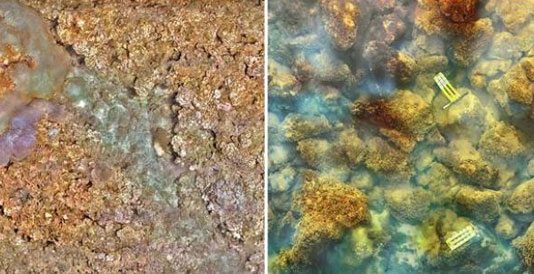 August 10, 2015 - Scientists from NOAA and the Cooperative Institute for Marine and Atmospheric Studies at the University of Miami have documented a dramatic shift from vibrant coral communities to carpets of algae in remote Pacific Ocean waters where an underwater volcano spews carbon dioxide. The new research published online August 10 in Nature Climate Change provides a stark look into the future of ocean acidification – the absorption by the global oceans of increasing amounts of human-caused carbon dioxide emissions. Scientists predict that elevated carbon dioxide absorbed by the global oceans will drive similar ecosystem shifts, making it difficult for coral to build skeletons and easier for other plants and animals to erode them.
August 10, 2015 - Scientists from NOAA and the Cooperative Institute for Marine and Atmospheric Studies at the University of Miami have documented a dramatic shift from vibrant coral communities to carpets of algae in remote Pacific Ocean waters where an underwater volcano spews carbon dioxide. The new research published online August 10 in Nature Climate Change provides a stark look into the future of ocean acidification – the absorption by the global oceans of increasing amounts of human-caused carbon dioxide emissions. Scientists predict that elevated carbon dioxide absorbed by the global oceans will drive similar ecosystem shifts, making it difficult for coral to build skeletons and easier for other plants and animals to erode them.NOAA Press Release
Nature Climate Change Article













